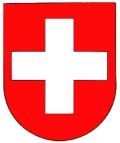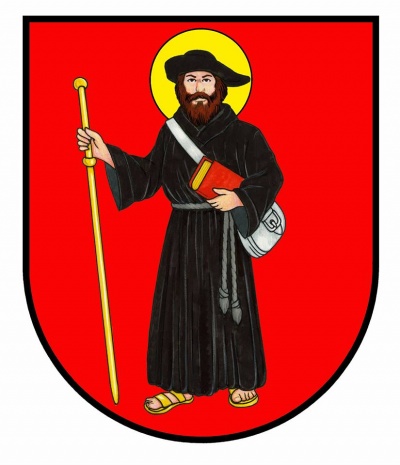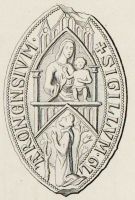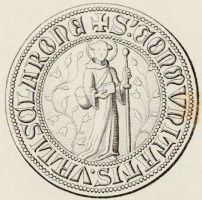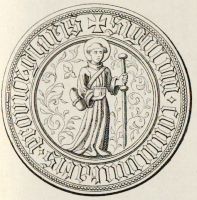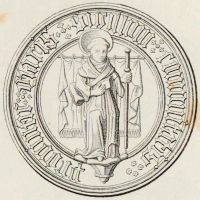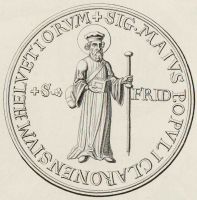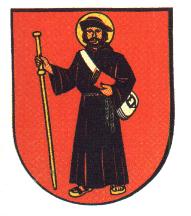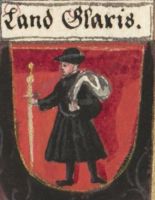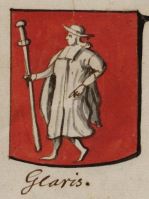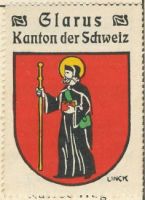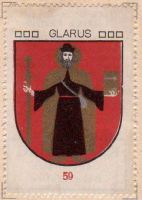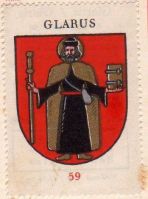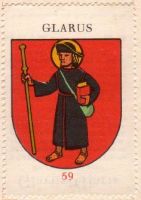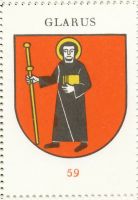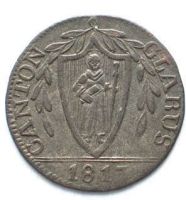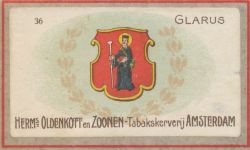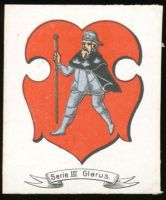Glarus (canton): Difference between revisions
Knorrepoes (talk | contribs) m (Text replacement - " Wapen- en Vlaggenboek van Gerrit Hesman (1708)" to " Wapen- en Vlaggenboek van Gerrit Hesman (1708)") |
Knorrepoes (talk | contribs) No edit summary |
||
| Line 12: | Line 12: | ||
The oldest use of the saint in the banners or arms of the district dates from 1352 when Glarus joined the Swiss confederation. Some older seals show Maria and Christ. All later images, seals and arms show St. Fridolinus. The saint is, however, shown in many different shapes, sizes and is sometimes facing left, sometimes facing right, most often with a abbott's stick, but also sometimes with a straight stick. He is always shown with a bible. | The oldest use of the saint in the banners or arms of the district dates from 1352 when Glarus joined the Swiss confederation. Some older seals show Maria and Christ. All later images, seals and arms show St. Fridolinus. The saint is, however, shown in many different shapes, sizes and is sometimes facing left, sometimes facing right, most often with a abbott's stick, but also sometimes with a straight stick. He is always shown with a bible. | ||
<gallery widths=250px heights=200px perrow=0> | |||
File:Glarus (canton)z1.jpg|alt=Siegel von Glarus/Seal of Glarus|The seal from 1319 | |||
File:Glarus (canton)z2.jpg|alt=Siegel von Glarus/Seal of Glarus|The seal from 1352-1650 | |||
File:Glarus (canton)z3.jpg|alt=Siegel von Glarus/Seal of Glarus|The seal from the late 14th century | |||
File:Glarus (canton)z4.jpg|alt=Siegel von Glarus/Seal of Glarus|The seal from the late 14th century | |||
File:Glarus (canton)z5.jpg|alt=Siegel von Glarus/Seal of Glarus|The seal from the 16th century | |||
</gallery> | |||
In 1861 the arms were properly described by Ludwig Stanz. He showed the saint with a straight black | In 1861 the arms were properly described by Ludwig Stanz. He showed the saint with a straight black staff, a red bible with golden lining, a green bag around his shoulders, black sandals with green laces. | ||
The next official drawing dates from 1931 and is basically the same, including the green bag. The latter, for which is no historical evidence, was highly debated. In 1941 the arms were renewed; the stick became gold, the historical colour, the bag became silver as did the shoes. | The next official drawing dates from 1931 and is basically the same, including the green bag. The latter, for which is no historical evidence, was highly debated. In 1941 the arms were renewed; the stick became gold, the historical colour, the bag became silver as did the shoes. | ||
| Line 33: | Line 30: | ||
The present arms date from 1959 and show a more modern-styled St. Fridolinus, with black shoes and a golden bible, which is in accordance to most historical images. The bag has also disappeared, even though it is seen on many historical images. The hands and face are now officially white, instead of natural colour. | The present arms date from 1959 and show a more modern-styled St. Fridolinus, with black shoes and a golden bible, which is in accordance to most historical images. The bag has also disappeared, even though it is seen on many historical images. The hands and face are now officially white, instead of natural colour. | ||
<gallery widths=250px heights=200px perrow=0> | |||
| | File:Glarus1500.jpg|alt=Wappen von Glarus/Arms of Glarus|The arms around 1500 | ||
File:Glarus (canton).hes.jpg|alt=Wappen von Glarus/Arms of Glarus|The arms in the [[Wapen- en Vlaggenboek Hesman|Wapen- en Vlaggenboek]] van Gerrit Hesman (1708) | |||
File:glarus01.hagch.jpg|alt=Wappen von Glarus/Arms of Glarus|Variation of the arms in the [[Kaffee Hag Wappen der Schweiz|Kaffee Hag albums]] 1914-1960 | |||
File:glarus2.hagch.jpg|alt=Wappen von Glarus/Arms of Glarus|Variation of the arms in the [[Kaffee Hag Wappen der Schweiz|Kaffee Hag albums]] 1914-1960 | |||
File:glarus4.hagch.jpg|alt=Wappen von Glarus/Arms of Glarus|Variation of the arms in the [[Kaffee Hag Wappen der Schweiz|Kaffee Hag albums]] 1914-1960 | |||
| | File:glarus5.hagch.jpg|alt=Wappen von Glarus/Arms of Glarus|Variation of the arms in the [[Kaffee Hag Wappen der Schweiz|Kaffee Hag albums]] 1914-1960 | ||
File:glarus8.hagch.jpg|alt=Wappen von Glarus/Arms of Glarus|Variation of the arms in the [[Kaffee Hag Wappen der Schweiz|Kaffee Hag albums]] 1914-1960 | |||
| | File:glarusc1.jpg|alt=Wappen von Glarus/Arms of Glarus|The arms on an 1817 coin (image from eBay) | ||
File:glarus.okz.jpg|alt=Wappen von Glarus/Arms of Glarus|The arms on a [[Oldenkott_(Switzerland)|Dutch tobacco card]] (+/- 1910) | |||
File:glarus.cva.jpg|alt=Wappen von Glarus/Arms of Glarus|The arms in an [[Continentale Verlags-Anstalt|album]] +/- 1905 | |||
</gallery> | |||
| | |||
{{media}} | {{media}} | ||
Revision as of 10:00, 3 September 2022
Swiss heraldry portal
This page is part of the Swiss heraldry portal |
Heraldry of the World |
|
Swiss civic heraldry:
|
Other heraldry: |
GLARUS
Official blazon
Origin/meaning
The arms of Glarus show St. Fridolinus, an Irish missionary, who travelled in (present) France and Switzerland. He founded a nunnery on a small island, which was later given by the German King to the city of Glarus. The saint also became the patron saint of the church in Glarus city. As this was for a long time the only church in the area, the saint became the patron saint of the whole district.
The oldest use of the saint in the banners or arms of the district dates from 1352 when Glarus joined the Swiss confederation. Some older seals show Maria and Christ. All later images, seals and arms show St. Fridolinus. The saint is, however, shown in many different shapes, sizes and is sometimes facing left, sometimes facing right, most often with a abbott's stick, but also sometimes with a straight stick. He is always shown with a bible.
In 1861 the arms were properly described by Ludwig Stanz. He showed the saint with a straight black staff, a red bible with golden lining, a green bag around his shoulders, black sandals with green laces.
The next official drawing dates from 1931 and is basically the same, including the green bag. The latter, for which is no historical evidence, was highly debated. In 1941 the arms were renewed; the stick became gold, the historical colour, the bag became silver as did the shoes.
| The arms of Glarus from 1941 |
The present arms date from 1959 and show a more modern-styled St. Fridolinus, with black shoes and a golden bible, which is in accordance to most historical images. The bag has also disappeared, even though it is seen on many historical images. The hands and face are now officially white, instead of natural colour.
The arms in the Wapen- en Vlaggenboek van Gerrit Hesman (1708)
Variation of the arms in the Kaffee Hag albums 1914-1960
Variation of the arms in the Kaffee Hag albums 1914-1960
Variation of the arms in the Kaffee Hag albums 1914-1960
Variation of the arms in the Kaffee Hag albums 1914-1960
Variation of the arms in the Kaffee Hag albums 1914-1960
The arms on a Dutch tobacco card (+/- 1910)
The arms in an album +/- 1905
Contact and Support
Partners:
Your logo here ?
Contact us
© since 1995, Heraldry of the World, Ralf Hartemink 
Index of the site
Literature : Mühlmann, L. : Wappen und Fahnen der Schweiz, Bühler Verlag, Lengnau, 1977 and 1997.
